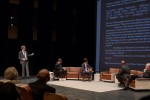The “10 Questions” lecture series, which will address a different question each week, doubles as a course for students and a panel open to the public. The series explores open-ended questions such as “What is beauty?”, “What is failure?” and “What is knowledge?”
Each week’s panel features two faculty members from the School of the Arts and Architecture and two faculty members from other departments who will approach the question of the week from the perspective of their academic disciplines.
A panelist described UCLA as a “city-state on a hill” to answer the question, “What is a university?”
Four faculty members from the arts, humanities and the UCLA administration discussed the essence, purpose and aspirations of a university from the perspectives of their fields in the final lecture of the “10 Questions” series Tuesday.
David Schaberg, dean of humanities, used examples from ancient Chinese texts to illustrate how universities had been perceived across time as institutions for the protection of freedom of thought.
“Whatever else they are, universities are remarkably old. They are incredibly stable, settled and malleable,” Schaberg said. “(They are) homes for the production, sharing, dissemination of knowledge.”
Jerry Kang, vice chancellor for equity, diversity and inclusion and a professor in the UCLA School of Law, said when he became an administrator he was surprised to discover UCLA functioning like a city-state, with a student senate and body. He believes universities serve as bulwarks of critical thought against a world in which reality is increasingly seen as debatable.
“Can it save us when everything else is going to hell?” Kang said. “Can the university be a city-state on a hill?”
Byronn Bain, African American studies and world arts and cultures/dance associate professor and a performing artist, recited an original poem. In it, he discussed the often-overlooked impact of African and Asian cultures on the development of Western university traditions.
“Imhotep was Hippocrates and Einstein’s intellectual father,” Bain said. “From column construction to medical surgery, who did all that … back in 2,700 B.C.?”
Bain also said universities must ensure people historically locked out of places of learning are given access to university resources. He played a short documentary filmed for a program he taught at a penitentiary, the California Institute for Women, to demonstrate the benefits of higher education for inmates.
Robert Watson, Neikirk Distinguished Professor of English, said universities are balanced between tradition and innovation, and scholars are in the best position to convey and challenge new and old ideas.
“Clusters of ideas, like clusters of cells, undergo a Darwinian competition that favors those good at replicating and spreading themselves, not necessarily the ones that fulfill our best potential,” Watson said. “A key function of artists and scholars is to challenge those convenient unifying functions of culture when they mislead us.”
He also defended the study of humanities against a purely economic understanding of its value.
“Teaching among Homo sapiens differs from the teaching among other species, precisely in this deferred and indirect mode of reward. Full-blown human pedagogy presupposes first the disposition to invest time in training without any immediate return … (and) involves a sophisticated aesthetic judgment of what constitutes a good performance,” he said. “I think the connection between humanity and humanities could hardly be clearer.”
In the Q&A section of the event, the panelists and attendees talked about the importance of not hiding behind UCLA’s name, and whether the university’s admission process, by denying access to thousands of applicants who wanted access to the school’s resources, was inevitably elitist.
Asavari Tiku, a fourth-year neuroscience student, said the discussion helped her vocalize her own questions about institutions such as universities.
“If the human race were erased, and then we started all over again, would these similar systems evolve? Would we still be thirsting for this organized institution for the pursuit of knowledge?” she said. “Or is it just artificial and we’re imposing some kind of structure to something that there shouldn’t be structure to?”
Anne Marie Burke, co-developer of “10 Questions” and executive director of communications and public relations for the School of the Arts and Architecture, said the public nature of the series itself helped UCLA fulfill its role as a university.
“(Our) mandate … as a public institution is to make what we do here and to make the university more porous, and to both welcome the public in and share out what it is that we do,” Burke said. “That responds to in my mind the highest kind of calling of the university.”
She added she hoped to hold a variation on the series again in the future.
